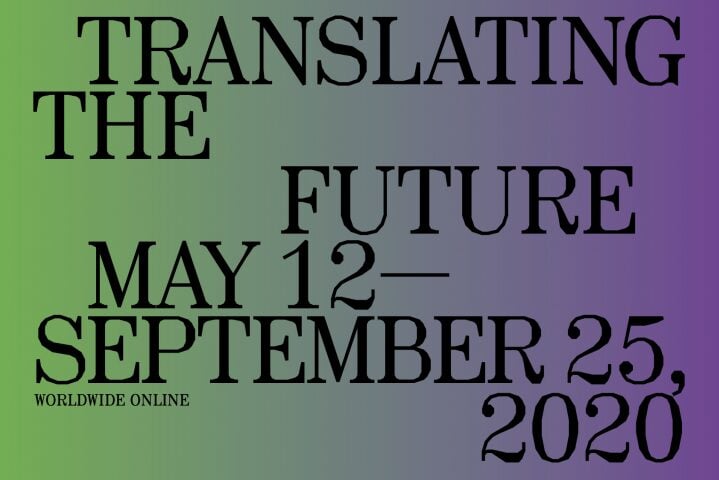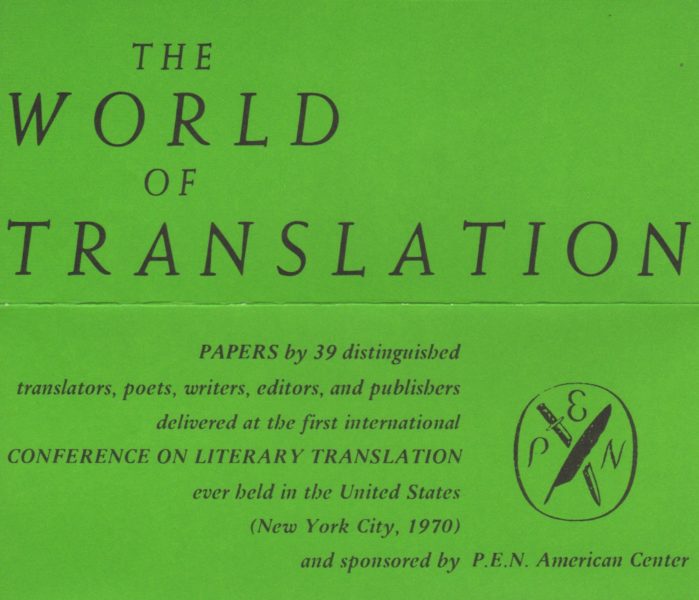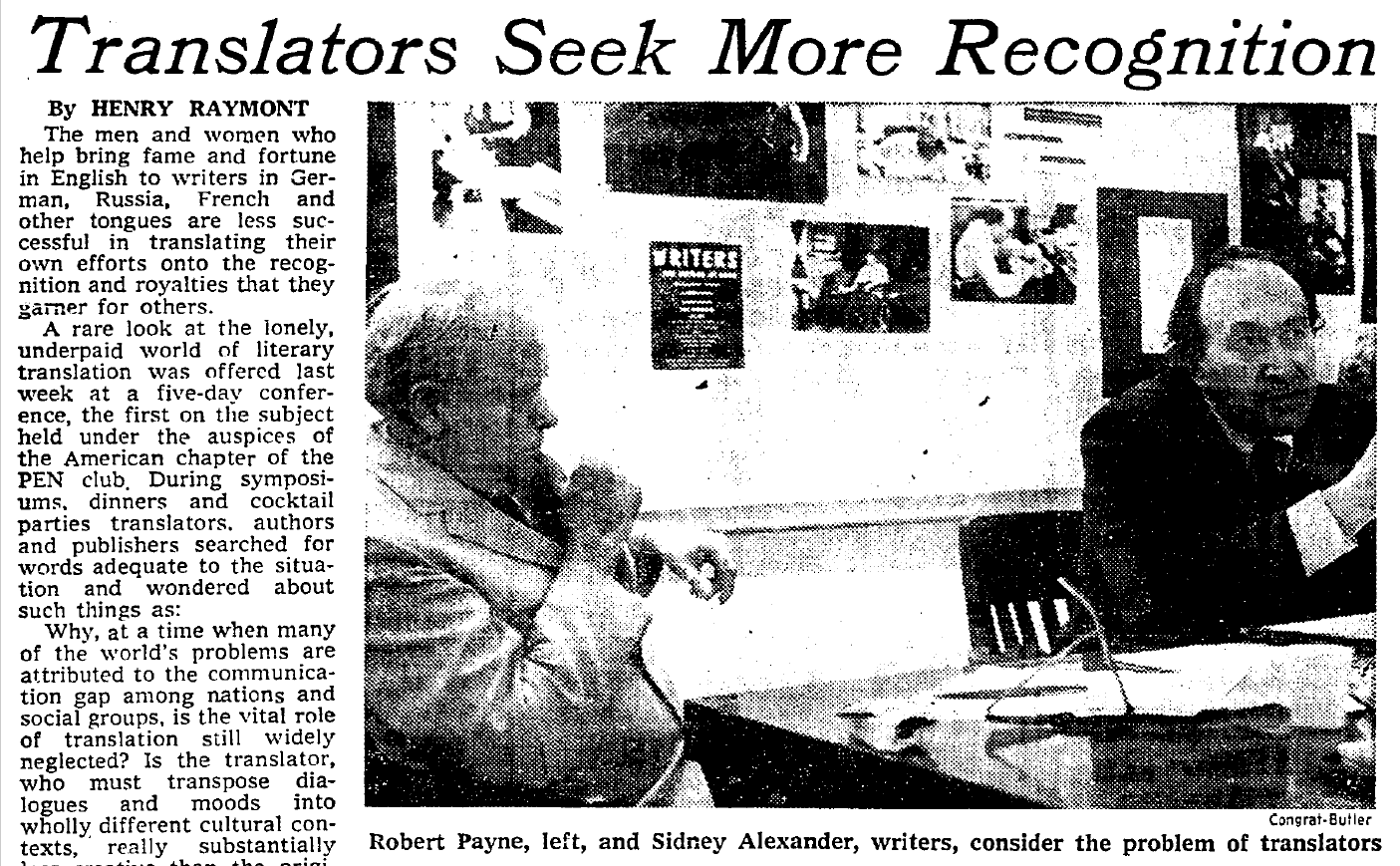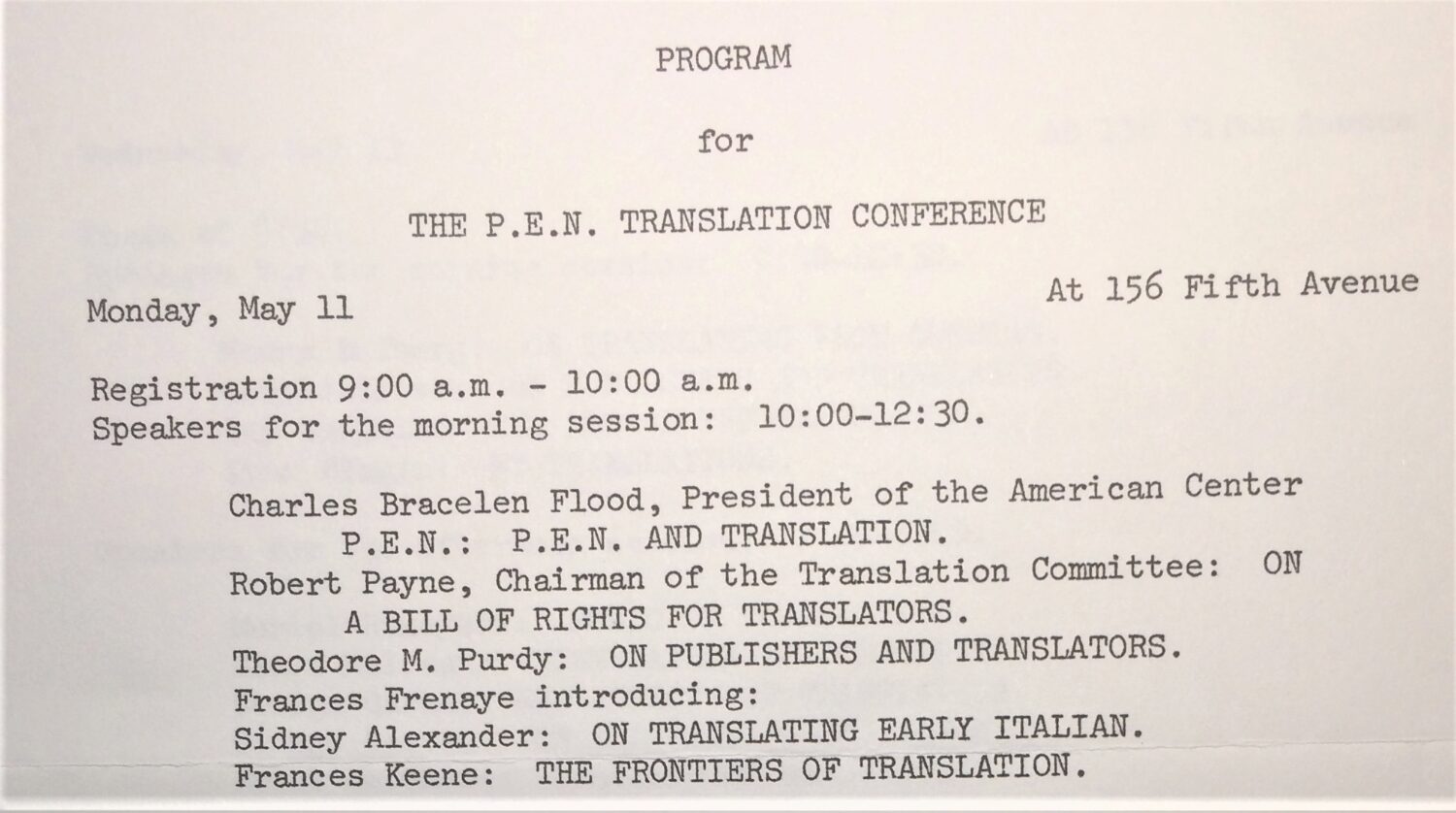Translating the Future

Translating the Future launched in 2020 with weekly hour-long online conversations with renowned translators throughout the late spring and summer and culminated in late September with several large-scale programs, including a symposium among Olga Tokarczuk’s translators into languages including English, Japanese, Hindi, and more.
The conference, co-sponsored by PEN America, the Center for the Humanities at The Graduate Center CUNY, and the Cullman Center for Scholars and Writers at the New York Public Library, with additional support from the Martin E. Segal Theatre Center, commemorated and carried forward PEN’s 1970 World of Translation conference, convened by Charles Bracelen Flood and Robert Payne, and featured Gregory Rabassa, Muriel Rukeyser, Irving Howe, Isaac Bashevis Singer, and many others. It billed itself as “the first international literary translation conference in the United States” and had a major impact on U.S. literary culture.
Browse the conference sessions:
From 1970 to 2020: Translation Transformations
Read more
We kicked off the Translating the Future conference and conversation series 50 years to the date from the World of Translation conference with “From 1970 to 2020: Translation Transformations,” a conversation with translators David Bellos and Karen Emmerich, which included snippets from the original audio archive of the World of Translation conference.
Translating the Uncertain Present
Read more
For most people on the planet, translation is a key part of everyday life. During the global pandemic crisis, it has become more crucial than ever, both for the information it can convey, and for the comfort a voice speaking one’s own language can bring. How does translation heal or cause trauma, and confront or abet authoritarianism? Kaza and Mounzer weighed in from Beirut and Brooklyn to ponder whether translation is a colonial practice or a decolonizing one. Can literary translation advance and defend human rights? Should it?
Global Ecopoetics: Poetry, Translation, Climate Change & Public Health
Read more
The translation of poetry is a form of globalization. World literature, which is often considered within the paradigm of cultural and economic exchange, might be seen as an ecosystem. What perils does this literary ecosystem face in the present moment, and what is its role in confronting the perils faced by individuals, communities, and the planet’s own ecosystem? Speaking from direct experience of the fires that ravaged California last year and the several disasters—natural and political—that have rocked Puerto Rico, Gander and Salas Rivera considered how poetry confronts such crises.
Children’s Literature in Translation
Read more
Translators of children’s literature—always read by both adults and children—face various unique challenges, including the potential for bi- or multilingualism, the incorporation of illustrations, and differing cultural taboos or views of what is and isn’t appropriate for children. Many classics of children’s literature (The Little Prince, Pippi Longstockings, the Grimm & Andersen fairy tales, etc.) are read in translation, even if they’re not treated the way adult books in translation would be. Are translators of works for children “translating for the future” by helping them to develop empathy and learn about other cultures in our globally connected world, or are they simply sharing universal stories full of delight and emotion that hopefully create lifelong readers?
A Manifesto For Our Time
Read more
Read the “Call for Action” from the 2020 Manifesto on Translation, and hear from the translators who have been working to update the manifesto drafted for the original 1970 conference, “The World of Translation”—read the 1970 manifesto—as they discuss questions such as: How do we recognize the progress that has been made over the past 50 years? What are our priorities in 2020? What is our vision for literary translation in the future?
Translating Plays and Playing With Translation
Read more
Ogawa and Tiang discussed translation as part of a playwriting practice, how they use language and translation in their own multilingual work, and how each aspect informs and affects the others in the writing, performance, and directing of their plays.
Motherless Tongues, Multiple Belongings I
Read more
Central to the monolingual paradigm is the cherished notion of the “mother tongue”: the single, home language instilled from birth. “This particular vision does not want to admit. . . the ability to live multiple belongings,” writes Yasemin Yildiz in her landmark 2012 Beyond the Mother Tongue. Angles, who translates from Japanese and has also won high honors in Japan for his poetry written in Japanese, and de la Torre, a poet who has written in and translated from both Spanish and English, discussed the joys and perils of their personal linguistic multiplicity.
Queer Literature, Queer Legacies: Looking Toward the Future of LGBTQ Translation
Read more
What strategies might inform our practice of translating queer literature, and what are the ethical implications of doing so? How might we draw on our own experiences of U.S. queer cultures in our work, and how might doing so reinforce American queer cultural hegemony? What structures might we as queer translators and writers want to build together in the future? Listen to the conversation, as we seek to move beyond issues of representation to discuss projects and processes related to queer literature in translation.
21st-Century Translation: What Has the Future Brought Us?
Read more
As technology has permeated every aspect of our lives, how has it affected literary translation? Hear from three of the most engaged industry professionals about the ways in which they have used data and technology to raise awareness and to determine what and who gets translated, as well as the promises and dangers that it represents for the future.
Subtitling Subtleties
Read more
The global success of Bong Joon Ho’s Oscar-winning Parasite confirmed a dramatic shift in what stories movie audiences across the world, and those in the United States, are willing to embrace as “universal.” Subtitlers, particularly those who make subtitles in the lingua franca that is English, play a crucial role in rendering films intelligible for such global reception. Parasite’s subtitler Darcy Paquet assessed this intricate art with Linda Hoaglund, a bilingual film director and producer and the subtitler of 250 Japanese films, including Miyazaki’s Spirited Away and Kurosawa’s Seven Samurai, and award-winning writer-director Xiaolu Guo (She, a Chinese, UFO in Her Eyes) responded from a filmmaker’s perspective.
Motherless Tongues, Multiple Belongings II
Read more
Translating the Future continued its dismantling of the monolingual paradigm, inspired by Yasemin Yildiz’s landmark 2012 Beyond the Mother Tongue and the work of Bruna Dantas Lobato. This event featured Cameroonian novelist Eric Tsimi, who writes in French and English and speaks a host of other languages; Boris Dralyuk, translator from the Russian and executive editor of the Los Angeles Review of Books; and poet, translator, and memoirist Rajiv Mohabir.
Channeling Ghost Languages of Europe
Read more
What is lost when a language is lost? How can all that the language meant be conveyed to someone outside its community of speakers? Martin Puchner, whose forthcoming book is on Rotwelsch—a secret thieves’ cant of the Central European underworld—discusses linguistic hauntings with Peter Constantine, a terminal speaker of Arvanitika, spoken in the Corinthian mountains of southern Greece.
Lightning in a Bottle: A Case Study of Publishing Literary Translation
Read more
What makes a successful book in translation? Have you ever wondered how many people are involved in various stages and how many pieces need to fall into place for an astonishing work of literary translation to make it into the hands and hearts of readers? Sponsored by Middlebury Language Schools.
Building Translator Communities and Communities for Translation
Read more
Literary translation was once a lonely profession, but translators no longer need toil in isolation. All manner of communities have sprung up to support translators and literature in translation. These speakers have founded blogs, publications, and databases, as well as collectives and reading series—both virtual and local—to fill the gaps and meet the needs of translators, editors, booksellers, and readers. Sponsored by Middlebury Language Schools.
Motherless Tongues, Multiple Belongings III
Read more
Translating the Future continued its dismantling of the monolingual paradigm, inspired by Yasemin Yildiz’s landmark 2012 Beyond the Mother Tongue and the work of Bruna Dantas Lobato. This event featured Janet Hong, writer and translator from the Korean; Pierre Joris, poet, essayist, editor, and translator from various languages; and María José Giménez, poet, translator, and editor.
Language as Polis
Read more
Languages are often identified with the countries where they are spoken, but for many languages, there is no one-to-one correspondence with any nation or state; the borders are unclear, contested, or unrecognized. How do speakers and students of such languages define themselves, engage with history, and examine the linguistic and cultural continuity embedded in them? What is the place and role of non-native speakers in these language communities? What does translation mean for them? How do these languages alter or enrich the languages and literatures that absorb or surround them? This conversation explored Yiddish, Frisian, Catalan, and beyond. Sponsored by the Institut Ramon Llull and the Yiddish Book Center.
(Re)Translating the Classics
Read more
It has been said that every generation deserves its own translation of literary classics. But who decides when it’s time for a new version, and by whom? How are these texts in dialogue with each other? What can these new editions tell us about ourselves? This conversation was about translating and writing through classic works from Sanskrit, Tamil, and Chinese.
Translating Trauma
Read more
Authors bear witness to trauma as a means of reckoning with it. And translations of such texts bring atrocities to light for readers in other languages. Choosing to translate this work is vital, but it can also take a toll on the body and mind of the translator. Three acclaimed translators talked about their experiences with narratives of conflict from recent history and the strategies they have used to bring these stories to us.
Activist Translation
Read more
Moving between languages is inevitably a political process, one that involves many forms of advocacy. Whether that means translating writers whose work is censored in their own languages and countries, promoting language justice locally within multilingual urban communities, or making choices within the text of a translation that challenge preconceived notions and advocate for new perspectives, translators—even those who may not be quite conscious of this fact—are activists.
On the Elusive Art of Translation
Read more
For the final event in our Tuesday conversation series, and the first event of Translating the Future’s culminating week, we heard from luminaries Kate Briggs, author of This Little Art; and former U.S. poet laureate Tracy K. Smith, whose forthcoming book, co-translated with Changtai Bi, is Yi Lei’s My Name Will Grow Wide Like a Tree. Sponsored by the Princeton University Program in Translation & Intercultural Communication.
Postmonolingual New York
Read more
To walk down almost any New York City street is to move through a shifting constellation of languages. Nearly half of all New Yorkers speak a language other than English at home, and close to a quarter don’t speak much English. Nevertheless, a monolingual paradigm persists in narratives of the city’s history and literature disseminated by its most prominent cultural and media institutions, which often portray non-English speakers as newcomers, recent arrivals, outsiders, or interlopers. Though its remarkable linguistic diversity has been a characteristic of the city for as long as it has existed, New Yorkers have come under attack in their own streets and subways for speaking languages that sounded “foreign” to Anglophone monolinguals. This evening’s speakers brought together just a few of the many threads of New York’s richly multilingual history.
Translating for a World on Fire
Read more
What does it mean to retranslate ancient classics for a present in crisis and to produce feminist translations of works understood as iconically male? Maria Dahvana Headley (whose new Beowulf has just appeared) and Emily Wilson (translator of The Odyssey, now at work on The Iliad) joined Literary Translating at Columbia (LTAC) Director Susan Bernofsky for a far-ranging conversation on the radical practice of making translation a space of resistance and joy.
Democracy and Translation
Read more
Democracy means different things to each of us. In this perilous time for language, as Natalie Diaz describes it, what multiplicity of forms does the struggle to liberate ourselves from structurally embedded violence take? How much does democracy need translation, and what role do translation and multilingualism play in our democracy? This conversation featured MacArthur Award-winning poet Natalie Diaz; Ken Liu, author of The Dandelion Dynasty series and translator of Chinese science fiction; and Marilyn Nelson, award-winning poet, translator, and author of How I Discovered Poetry.
A Flight of Tokarczuk Translators
Read more
When Olga Tokarczuk was awarded the Nobel Prize in Literature, readers all over the world were able to celebrate because her writing has been translated into dozens of languages. Tokarczuk has been hugely appreciative of the remarkable individuals who have done this work, writing, “It’s hard for me to express the relief that comes with being able to share authorship with someone,” in an essay titled—in Jennifer Croft’s translation—“How Translators Are Saving The World.” This landmark event brought together 12 of these talented people—working from Polish to English, Japanese, Hindi, Ukrainian, German, Czech, Norwegian, Italian, Brazilian Portuguese, and Romanian—to compare and contrast their experiences working with this challenging and dynamic author over the course of her career. This prismatic lens offers an extraordinary opportunity to examine the art of translation across languages and borders. Sponsored by the Polish Cultural Institute New York, the Boston University Center for the Humanities, the Princeton University Program in Translation & Intercultural Communication, and the East Central European Center at Columbia University.
From PEN’s 1970 World of Translation Conference

Read this essay on Our Age Of Translation by Jonathan Cohen.

Read this article about the 1970 World in Translation conference, “Translators Seek More Recognition,” published in The New York Times.

Read the original 1970 World of Translation conference program and table of contents.
With gratitude to Margaret Carson and Jonathan Cohen for their assistance and contributions to these archival materials from PEN’s 1970 World of Translation conference.
